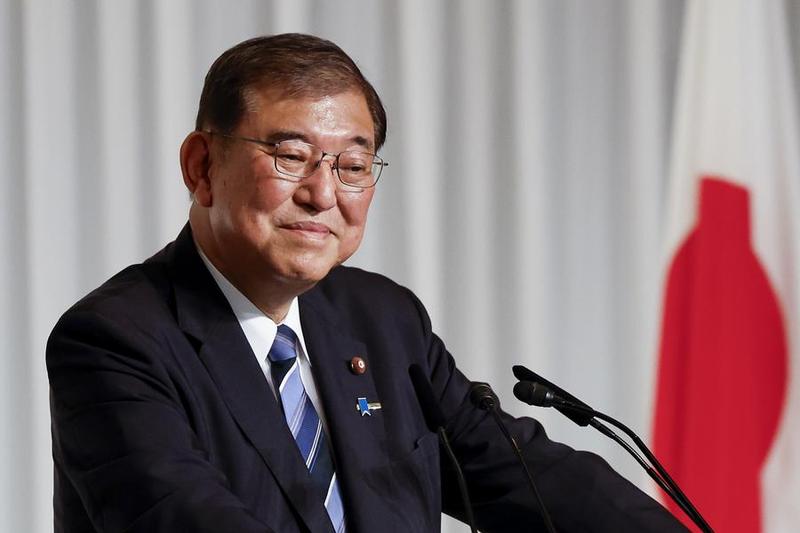Ishiba's visit to gratify Washington at cost of neighbors


Japanese Prime Minister Shigeru Ishiba paid his first official visit to the US from Feb 6 to 8, during which he met with US President Donald Trump. Although Trump promised to deepen bilateral economic and security cooperation, he did not rule out the possibility of imposing extra tariffs on Japanese goods in the near future.
The problem is that, by currying security favor with the US, Ishiba is further complicating China-Japan relations.
Ishiba visited the US at a time when domestic and international situations are undergoing dramatic changes. During his 2024 presidential campaign, Trump asserted that he values the US-Japan alliance. But he also said he expects Japan to take on a greater share of the defense cost. Trump's expectations created a major problem for Ishiba because at the time, he was leading (and still leads) a minority government with a falling job approval rating.
Before Ishiba's visit to the US, some Japanese media outlets raised concerns over the timing of the visit. First, the Japanese side is worried that because of the Israel-Palestine conflict and the Ukraine crisis, as well as the tariff war the US administration has newly launched against Canada, Mexico and China, US-Japan ties may not be on the new US administration's radar, which means Japan is strategically less important than other issues for the US at the moment.
During his meeting with Ishiba, Trump pledged to lead US-Japan ties toward a "new golden age". Ishiba and Trump even managed to build some trust between the two sides. In fact, Ishiba praised Trump in a joint news conference, saying the US president is "very sincere and very powerful".
Second, the Japanese side is also worried that if Trump were to continue the tariff war, Japan could become his next target, not least because Japan had a $68.5 billion trade surplus in goods with the US last year. As a top US official once said, if you are not on the table, you will be on the menu. In the meeting with Trump, Ishiba also emphasized that Japan has led foreign direct investments in the US for the past five years and highlighted Japanese companies' record in creating jobs in the US.
Ishiba also promised to take concrete steps to ease US concerns over the trade surplus, including increasing Japanese investments in the US to an "unprecedented" $1 trillion, importing "record volumes" of American liquefied natural gas by establishing a joint venture with Alaska oil and gas companies, and possibly importing bioethanol, ammonia and other resources from the US.
Even though Trump said he wanted "equality" in US-Japan trade, he didn't rule out the possibility of levying tariffs on Japanese goods, but believes the issue can be resolved without "punitive action".
Third, the Japanese side believes the US-Japan security treaty is the cornerstone of Japan's post-war foreign policy, and Japan needs the so-called nuclear umbrella of the US. The joint statement must have given Ishiba some relief, as it says that the US-Japan alliance remains the cornerstone of peace, security and prosperity in the Asia-Pacific and beyond. The US also emphasized its unwavering commitment to the defense of Japan.
However, Trump's reassurance has come for a price, as Ishiba had to pledge that Japan would increase its defense budget to 2 percent of GDP by fiscal 2027. At their meeting, the two leaders discussed how to deepen cooperation in space, and seek new joint business opportunities in fields such as artificial intelligence, quantum computing and semiconductors. In particular, Japan has committed to purchasing additional US high-tech equipment.
And fourth, the Ishiba government has adopted a dual strategy that seeks to maintain strong ties with both the US and China, which requires Japan to balance economic interests and security commitments, which may be a big challenge for Ishiba. According to the joint leaders' statement, the two countries discussed the Diaoyu Islands and South China Sea issues, and the Taiwan question.
China has been warning the US and Japan to not interfere in China's internal affairs, which the Taiwan question is. While Ishiba hinted at adopting a pragmatic approach toward Sino-Japanese relations, enhancing security cooperation with the US will obviously impede his efforts.
Another alarming factor for Ishiba is that, to everyone's astonishment, Trump announced in the news conference that Nippon Steel would invest in the US steel sector instead of acquiring the United States Steel Corporation. As a matter of fact, Trump had earlier said that he would block the acquisition, as he saw the issue as a matter of US national interest and economic security. This shows that for Trump, there is no difference between Japan and China when it comes to the US' economic interests.
Even US allies like the European Union and Japan could face tough sanctions or tariffs whenever the current US administration feels it is necessary to impose them. Therefore, it would be unwise of Japan to try and appease US government by increasing investments in the US and importing more US goods, because he can never be satisfied.
The author is an associate professor at the China Institutes of Contemporary International Relations. The views don't necessarily represent those of China Daily.
If you have a specific expertise, or would like to share your thought about our stories, then send us your writings at opinion@chinadaily.com.cn, and comment@chinadaily.com.cn.


































